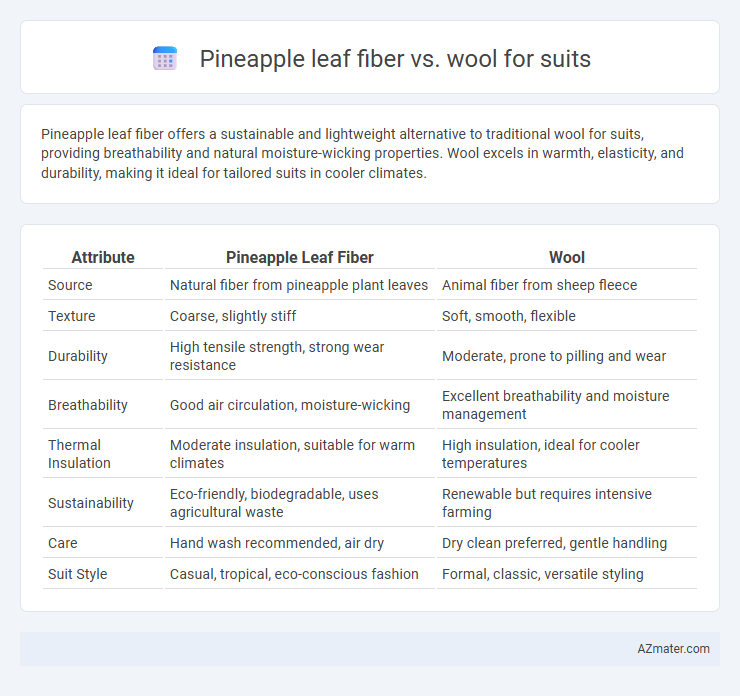Pineapple leaf fiber offers a sustainable and lightweight alternative to traditional wool for suits, providing breathability and natural moisture-wicking properties. Wool excels in warmth, elasticity, and durability, making it ideal for tailored suits in cooler climates.
Table of Comparison
| Attribute | Pineapple Leaf Fiber | Wool |
|---|---|---|
| Source | Natural fiber from pineapple plant leaves | Animal fiber from sheep fleece |
| Texture | Coarse, slightly stiff | Soft, smooth, flexible |
| Durability | High tensile strength, strong wear resistance | Moderate, prone to pilling and wear |
| Breathability | Good air circulation, moisture-wicking | Excellent breathability and moisture management |
| Thermal Insulation | Moderate insulation, suitable for warm climates | High insulation, ideal for cooler temperatures |
| Sustainability | Eco-friendly, biodegradable, uses agricultural waste | Renewable but requires intensive farming |
| Care | Hand wash recommended, air dry | Dry clean preferred, gentle handling |
| Suit Style | Casual, tropical, eco-conscious fashion | Formal, classic, versatile styling |
Introduction to Sustainable Suit Materials
Pineapple leaf fiber offers a sustainable alternative to traditional wool in suit making, derived from agricultural waste with a lower environmental footprint. This natural fiber is biodegradable, requires less water, and avoids the methane emissions associated with sheep farming. Wool provides excellent insulation and durability but involves higher resource consumption and animal welfare concerns, making pineapple leaf fiber an innovative choice for eco-conscious fashion.
Overview of Pineapple Leaf Fiber
Pineapple leaf fiber, a natural and sustainable textile derived from pineapple plant leaves, offers high tensile strength and breathability, making it an innovative alternative to traditional fibers like wool for suits. Its eco-friendly production reduces waste and environmental impact compared to wool, which requires intensive animal farming and processing. Pineapple leaf fiber's lightweight, moisture-wicking properties provide comfort and durability, appealing to environmentally conscious consumers seeking sustainable fashion options.
Overview of Wool as a Traditional Textile
Wool, a traditional textile derived from sheep fleece, is renowned for its natural insulation, breathability, and moisture-wicking properties, making it ideal for classic suit tailoring. Its crimped fibers provide elasticity and shape retention, while offering durability and wrinkle resistance that suits formal wear demands. Compared to pineapple leaf fiber, wool's long-standing reputation in luxury fashion and proven comfort under varied climates enhances its appeal for premium suits.
Environmental Impact: Pineapple Leaf Fiber vs Wool
Pineapple leaf fiber production uses agricultural waste, significantly reducing environmental pollution and lowering water consumption compared to traditional wool farming. Wool requires large amounts of land, water, and produces methane emissions from sheep, contributing to higher carbon footprints. Using pineapple leaf fiber for suits offers a sustainable alternative with biodegradable properties and a smaller ecological footprint than wool.
Durability and Longevity Comparison
Pineapple leaf fiber exhibits exceptional durability, resisting wear and tear better than many natural fibers due to its high tensile strength and resistance to moisture, making it suitable for long-lasting suits. Wool, while also renowned for durability, offers superior elasticity and natural crimp, enhancing wrinkle resistance but may degrade faster under constant abrasion. Comparing longevity, pineapple leaf fiber suits tend to maintain structural integrity over time without frequent pilling, whereas wool requires careful maintenance to prevent thinning and moth damage.
Comfort and Breathability Factors
Pineapple leaf fiber offers a lightweight, breathable fabric that enhances comfort by allowing better air circulation and moisture absorption compared to traditional wool. Wool provides excellent insulation and natural moisture-wicking properties but can feel heavier and less breathable in warm climates. Choosing pineapple leaf fiber suits is ideal for those seeking eco-friendly, breathable attire with superior comfort in hot and humid conditions.
Aesthetic and Style Differences
Pineapple leaf fiber suits offer a unique, natural texture with a subtle sheen, creating a modern and eco-friendly aesthetic that contrasts sharply with the classic, rich warmth of wool suits. Wool provides exceptional drape and a timeless look with its smooth, dense fibers, ideal for formal and traditional styles, while pineapple fiber emphasizes sustainability and innovation with a slightly coarser but visually intriguing surface. The distinct appearance of pineapple fiber suits often appeals to fashion-forward individuals seeking an organic vibe, whereas wool remains preferred for its versatility and refined elegance in a wide range of sartorial settings.
Cost and Accessibility of Both Fabrics
Pineapple leaf fiber suits offer a sustainable, cost-effective alternative to traditional wool, often priced lower due to the renewable nature of the plant-based material and lower processing costs. Wool suits, while generally more expensive, provide widespread availability through established supply chains and a variety of grades from affordable to premium options. Access to pineapple leaf fiber fabric remains limited to niche markets and eco-conscious brands, whereas wool is readily accessible worldwide in numerous textile outlets.
Suit Care and Maintenance Requirements
Pineapple leaf fiber suits demand gentle hand washing or dry cleaning with minimal water exposure to prevent fiber damage, while wool suits require regular dry cleaning and careful brushing to maintain their natural lanolin content and texture. Pineapple fiber is more susceptible to brittleness and color fading, necessitating storage in cool, dark places with breathable garment bags to avoid moisture buildup and UV damage. Wool suits benefit from periodic airing and moth repellent usage to preserve durability and softness, making maintenance more straightforward than the delicate care pine fiber suits require.
Future Trends in Eco-Friendly Suit Fabrics
Pineapple leaf fiber is emerging as a sustainable alternative to wool in the suit fabric industry due to its biodegradable properties, low environmental impact, and natural breathability. Innovations in textile technology are enhancing the durability and softness of pineapple leaf fiber, making it increasingly suitable for high-quality, eco-friendly suits. Market demand for cruelty-free, renewable materials is driving the growth of pineapple leaf fiber, positioning it as a key player in the future of sustainable suit fabrics.

Infographic: Pineapple leaf fiber vs Wool for Suit
 azmater.com
azmater.com